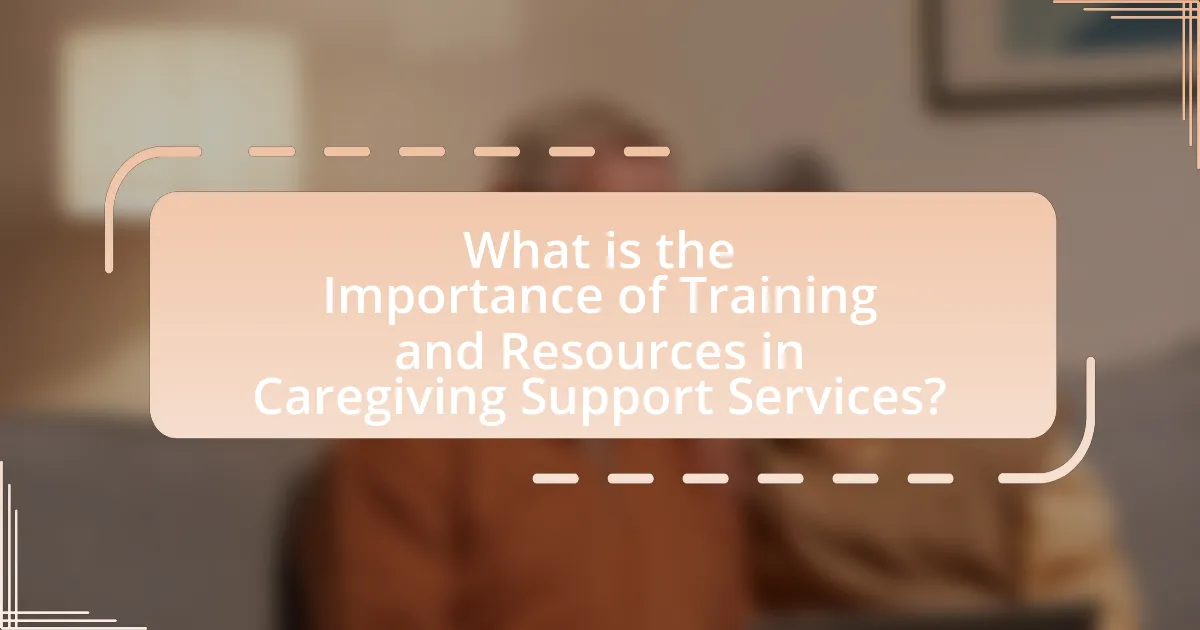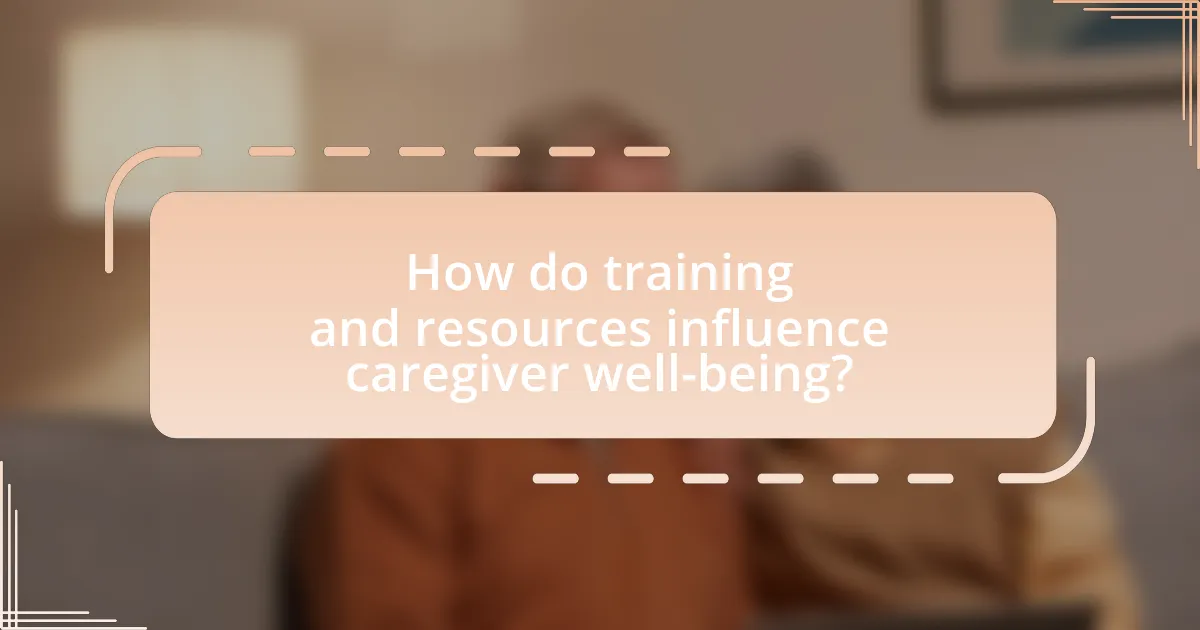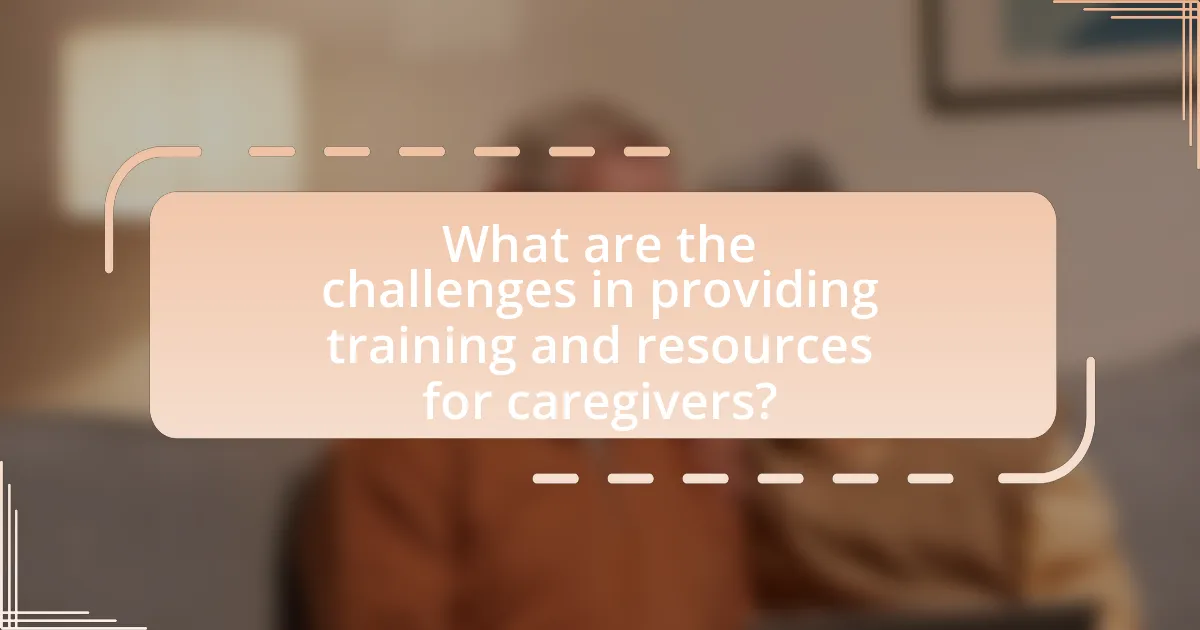The article emphasizes the critical role of training and resources in caregiving support services, highlighting how they enhance the quality of care provided to individuals. It discusses the necessity of equipping caregivers with essential skills such as communication, empathy, and medication management, which directly influence patient outcomes and caregiver confidence. Additionally, the article outlines the importance of access to resources, including training programs, support groups, and technology, in improving caregiver performance and job satisfaction. It also addresses the challenges organizations face in providing adequate training and resources, along with best practices to overcome these barriers and ensure effective caregiving support.

What is the Importance of Training and Resources in Caregiving Support Services?
Training and resources are crucial in caregiving support services as they enhance the quality of care provided to individuals. Proper training equips caregivers with essential skills and knowledge, enabling them to address the diverse needs of those they support effectively. For instance, a study published in the Journal of Gerontological Nursing found that caregivers who received specialized training reported higher confidence levels and improved patient outcomes. Additionally, access to resources such as updated care protocols and support networks ensures caregivers can deliver informed and compassionate care, ultimately leading to better health and well-being for clients.
Why is training essential for caregivers?
Training is essential for caregivers because it equips them with the necessary skills and knowledge to provide effective and safe care. Caregivers face diverse challenges, including managing medical conditions, understanding patient needs, and ensuring emotional support. Research indicates that trained caregivers demonstrate improved patient outcomes, such as reduced hospital readmissions and enhanced quality of life for those they care for. For instance, a study published in the Journal of Nursing Scholarship found that caregivers who received specialized training reported higher confidence levels and better communication skills, leading to more effective care delivery.
What specific skills should caregivers be trained in?
Caregivers should be trained in essential skills such as communication, empathy, personal care, medication management, and emergency response. Effective communication skills enable caregivers to interact clearly with patients and their families, fostering trust and understanding. Empathy is crucial for providing emotional support and understanding the needs of those in their care. Personal care skills, including assistance with daily activities like bathing and dressing, are fundamental for maintaining the dignity and comfort of patients. Medication management training ensures caregivers can accurately administer medications and recognize side effects, which is vital for patient safety. Lastly, emergency response training equips caregivers with the ability to act swiftly and effectively in crisis situations, potentially saving lives. These skills are supported by research indicating that well-trained caregivers improve patient outcomes and satisfaction (National Institute on Aging, 2020).
How does training impact the quality of care provided?
Training significantly enhances the quality of care provided by equipping caregivers with essential skills and knowledge. Well-structured training programs improve caregivers’ competencies in areas such as communication, empathy, and technical skills, which directly influence patient outcomes. For instance, a study published in the Journal of Nursing Administration found that facilities with comprehensive training programs reported a 30% reduction in medication errors and a 25% increase in patient satisfaction scores. This evidence underscores the critical role that training plays in ensuring high standards of care and fostering a safe, effective caregiving environment.
What resources are critical for effective caregiving support?
Critical resources for effective caregiving support include training programs, access to healthcare professionals, support groups, and informational materials. Training programs equip caregivers with essential skills and knowledge, enhancing their ability to provide quality care. Access to healthcare professionals ensures caregivers can consult experts for medical advice and support, which is vital for managing complex health needs. Support groups offer emotional and social support, helping caregivers cope with the challenges they face. Informational materials, such as guides and online resources, provide caregivers with valuable information on best practices and available services, facilitating better care outcomes.
What types of resources are available for caregivers?
Caregivers have access to various resources, including educational programs, support groups, financial assistance, and respite care services. Educational programs provide training on caregiving skills and health management, while support groups offer emotional support and shared experiences among caregivers. Financial assistance can come from government programs or non-profit organizations that help alleviate the costs associated with caregiving. Respite care services allow caregivers to take breaks while ensuring that their loved ones receive proper care. These resources are essential for enhancing the well-being and effectiveness of caregivers in their roles.
How do resources enhance caregiver performance?
Resources enhance caregiver performance by providing essential tools, training, and support that improve their skills and efficiency. Access to educational materials, workshops, and ongoing training programs equips caregivers with the latest knowledge and techniques in patient care, leading to better outcomes for those they serve. For instance, a study published in the Journal of Nursing Administration found that caregivers who participated in structured training programs demonstrated a 30% increase in patient satisfaction scores compared to those who did not receive such training. Additionally, resources like technology and support networks facilitate communication and collaboration among caregivers, further enhancing their ability to provide high-quality care.

How do training and resources influence caregiver well-being?
Training and resources significantly enhance caregiver well-being by equipping them with essential skills and knowledge to manage their responsibilities effectively. Caregivers who receive proper training report lower levels of stress and burnout, as they feel more competent in handling challenging situations. For instance, a study published in the Journal of Gerontological Nursing found that caregivers who participated in training programs experienced a 30% reduction in perceived stress levels. Additionally, access to resources such as support groups and informational materials fosters a sense of community and reduces feelings of isolation, further contributing to improved mental health and overall well-being.
What role does training play in caregiver confidence?
Training significantly enhances caregiver confidence by equipping them with essential skills and knowledge necessary for effective caregiving. When caregivers undergo structured training programs, they gain a deeper understanding of care techniques, communication strategies, and problem-solving skills, which directly contribute to their self-assurance in handling various situations. Research indicates that caregivers who receive training report higher levels of confidence and lower levels of stress, as they feel more prepared to meet the needs of those they care for. For instance, a study published in the Journal of Gerontological Nursing found that caregivers who participated in training workshops demonstrated a 30% increase in confidence levels compared to those who did not receive training. This evidence underscores the critical role that training plays in fostering caregiver confidence, ultimately leading to improved care quality and caregiver well-being.
How can training reduce caregiver stress and burnout?
Training can significantly reduce caregiver stress and burnout by equipping caregivers with essential skills and knowledge to manage their responsibilities effectively. When caregivers receive training, they learn effective coping strategies, time management techniques, and communication skills that enhance their ability to handle challenging situations. Research indicates that trained caregivers report lower levels of stress and higher job satisfaction, as they feel more competent and confident in their roles. For instance, a study published in the Journal of Gerontological Nursing found that caregivers who participated in training programs experienced a 30% reduction in perceived stress levels compared to those who did not receive training. This evidence underscores the critical role of training in alleviating caregiver stress and preventing burnout.
What are the long-term benefits of ongoing training for caregivers?
Ongoing training for caregivers leads to improved quality of care, enhanced job satisfaction, and reduced turnover rates. Continuous education equips caregivers with updated skills and knowledge, enabling them to provide better support to clients, which is crucial in a field that often faces evolving health challenges. Research indicates that organizations investing in ongoing training experience a 30% reduction in staff turnover, which not only saves costs associated with hiring and training new employees but also fosters a more stable environment for clients. Additionally, caregivers who receive regular training report higher levels of job satisfaction, which correlates with better performance and client outcomes.
How do resources support caregivers in their daily tasks?
Resources support caregivers in their daily tasks by providing essential tools, information, and training that enhance their caregiving capabilities. For instance, access to educational materials and workshops equips caregivers with knowledge about best practices in patient care, which can lead to improved outcomes for those they assist. Additionally, resources such as respite care services allow caregivers to take necessary breaks, reducing burnout and maintaining their well-being. Research indicates that caregivers who utilize support resources report higher satisfaction and lower stress levels, demonstrating the effectiveness of these resources in facilitating daily caregiving tasks.
What tools and technologies can assist caregivers?
Tools and technologies that can assist caregivers include telehealth platforms, medication management apps, and wearable health devices. Telehealth platforms enable caregivers to connect with healthcare professionals remotely, facilitating timely consultations and support. Medication management apps help caregivers track medication schedules and dosages, reducing the risk of errors. Wearable health devices monitor vital signs and activity levels, providing caregivers with real-time health data to inform care decisions. These technologies enhance communication, improve medication adherence, and enable proactive health monitoring, ultimately supporting caregivers in delivering effective care.
How can access to resources improve caregiver job satisfaction?
Access to resources significantly enhances caregiver job satisfaction by providing essential tools, training, and support necessary for effective caregiving. When caregivers have access to resources such as training programs, mental health support, and adequate staffing, they experience reduced stress and increased confidence in their roles. Research indicates that caregivers who receive proper training and resources report higher job satisfaction levels, as they feel more competent and valued in their positions. For instance, a study published in the Journal of Applied Gerontology found that caregivers with access to training resources experienced a 30% increase in job satisfaction compared to those without such access. This correlation underscores the importance of resources in fostering a positive work environment for caregivers.

What are the challenges in providing training and resources for caregivers?
Providing training and resources for caregivers faces several challenges, including limited funding, varying levels of caregiver experience, and accessibility issues. Limited funding restricts the development and delivery of comprehensive training programs, which can lead to inadequate preparation for caregivers. Additionally, caregivers often come from diverse backgrounds with different levels of experience and knowledge, making it difficult to create a one-size-fits-all training approach. Accessibility issues, such as geographical barriers and lack of online resources, further hinder caregivers from obtaining necessary training and support. These challenges collectively impact the effectiveness of caregiving services and the well-being of both caregivers and those they support.
What barriers do organizations face in offering training?
Organizations face several barriers in offering training, including budget constraints, lack of time, and insufficient resources. Budget constraints often limit the ability to invest in comprehensive training programs, as many organizations operate with tight financial margins. Additionally, the lack of time for employees to participate in training sessions can hinder the implementation of effective training initiatives, especially in caregiving support services where staff are often stretched thin. Insufficient resources, such as qualified trainers or appropriate training materials, further complicate the ability to provide effective training. According to a report by the Association for Talent Development, 70% of organizations cite budget limitations as a significant barrier to training, highlighting the widespread nature of this issue.
How can organizations overcome these barriers?
Organizations can overcome barriers in caregiving support services by implementing comprehensive training programs and ensuring access to adequate resources. Comprehensive training equips caregivers with essential skills and knowledge, which has been shown to improve service quality and caregiver confidence. For instance, a study published in the Journal of Aging & Social Policy found that organizations providing structured training programs saw a 30% increase in caregiver satisfaction and a 25% reduction in turnover rates. Additionally, ensuring access to resources such as mental health support and technology tools can alleviate stress and enhance service delivery. Research from the National Institute on Aging indicates that organizations that invest in resources experience better outcomes in caregiver performance and client satisfaction.
What are the implications of inadequate training and resources?
Inadequate training and resources in caregiving support services lead to decreased quality of care and increased risk of errors. Caregivers lacking proper training may struggle to meet the complex needs of clients, resulting in poor health outcomes. For instance, a study published in the Journal of Nursing Administration found that insufficient training directly correlates with higher rates of medication errors and patient dissatisfaction. Additionally, inadequate resources can lead to caregiver burnout, as they may be overwhelmed by their responsibilities without the necessary tools or support. This burnout further exacerbates the quality of care, creating a cycle of inadequacy that negatively impacts both caregivers and clients.
What best practices can enhance training and resource provision?
Best practices that can enhance training and resource provision include implementing a structured curriculum, utilizing diverse training methods, and ensuring ongoing support and evaluation. A structured curriculum provides clear learning objectives and outcomes, which helps caregivers understand their roles and responsibilities effectively. Utilizing diverse training methods, such as hands-on workshops, online modules, and peer mentoring, caters to different learning styles and increases engagement. Ongoing support and evaluation, through regular feedback and refresher courses, ensure that caregivers remain updated on best practices and can adapt to changing needs in caregiving. Research indicates that organizations that adopt these practices see improved caregiver performance and satisfaction, ultimately leading to better care outcomes.
How can organizations effectively assess training needs?
Organizations can effectively assess training needs by conducting a comprehensive needs analysis that includes employee surveys, performance evaluations, and skills gap assessments. This approach allows organizations to identify specific areas where training is required, ensuring that the training provided aligns with both organizational goals and employee development. For instance, a study by the Association for Talent Development found that organizations that conduct thorough training needs assessments are 30% more likely to achieve their training objectives. By utilizing data-driven methods, organizations can prioritize training initiatives that will have the most significant impact on performance and service quality in caregiving support services.
What strategies can be implemented to ensure resource accessibility?
To ensure resource accessibility, organizations can implement strategies such as developing comprehensive resource directories, enhancing digital platforms for easy navigation, and providing training for staff on resource utilization. Comprehensive resource directories allow caregivers to quickly identify available services, while user-friendly digital platforms facilitate access to information. Training staff on how to effectively use these resources ensures that they can assist clients in navigating available options. Research indicates that organizations with structured resource management systems report higher satisfaction rates among caregivers and clients, demonstrating the effectiveness of these strategies in improving resource accessibility.
What practical tips can improve caregiving support services?
To improve caregiving support services, implementing comprehensive training programs for caregivers is essential. These programs should focus on enhancing skills in communication, empathy, and specific care techniques, which are critical for effective caregiving. Research indicates that well-trained caregivers demonstrate higher job satisfaction and better patient outcomes, as evidenced by a study published in the Journal of Nursing Administration, which found that training significantly reduced caregiver burnout and improved the quality of care provided. Additionally, providing access to resources such as mental health support, peer networking opportunities, and ongoing education can further empower caregivers, leading to more effective and compassionate care delivery.